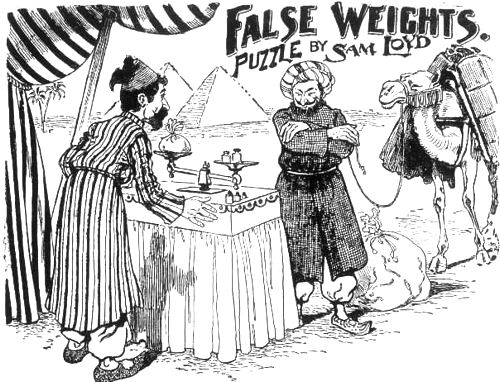



I FOUND THAT THE money of the East was coined in variable sizes and weights to facilitate the swindling of travelers, and of itself is too difficult and complex a puzzle for our mathematicians, so in describing the following manner of trading among the Orientals we will simplify matters by talking in dollars and cents. Camels' hair, which enters largely into the manufacture of shawls and expensive rugs, is gathered by what is known as the common people and sold through a commission broker, in small or large lots, to the merchants. To insure impartiality, the broker never buys for himself, but upon receiving an order to buy, finds some one who wishes to sell, and charges 2 percent commission to each of them, thereby making 4 percent on the transaction. Nevertheless, by juggling with the scales, he always manages to add to his profit by cheating, the more especially if a customer is green enough to place any confidence in his word or pious exclamations.
I take occasion to call attention to a pretty puzzle connected with a transaction which aptly illustrates the simplicity of his methods. Upon receiving a consignment of camel's hair he placed the same upon the short arm of his scales, so as to make the goods weigh one ounce light to the pound, but when he came to sell it he reversed the scales so as to give one ounce to the pound short, and thus made by cheating.
It appears to be—and as a matter of fact is—a very simple problem, with clear and sufficient data for the purpose. Nevertheless, it will tax the cleverness of an expert bookkeeper to figure out a correct answer to the question as to how much did he pay for the goods?
In regard to the puzzle of the broker in camel's hair who used a pound weight of seventeen ounces when buying and sold with a fifteen-ounce weight, so that he made $25 by cheating in addition to his two commissions of 2 percent, it may be said that the ordinary methods by algebra or ratio and proportion seemingly fail to give a satisfactory answer, so I will attempt to give a plain, common-sense explanation, based upon simple arithmetic.
In the first place, if the broker weighed the goods with a pound weight one ounce too heavy, he got 17 ounces for a pound. When he sold them by a weight one ounce light he gave 15 ounces for a pound, and had two ounces over. If these two ounces were sold at the same price, so as to make $25 by cheating, it is plain that the two ounces represent 2/15ths of what he paid for the whole and charged for the 15 ounces. One-fifteenth being worth $12.50, fifteen-fifteenths, or the whole, would be $187.50, which, if there was no question of commission would be what he paid for the goods.
We find, however, that he received 2 percent, from the seller, S3.75, and $4.25 from the purchaser, making $8 brokerage in addition to $25, by cheating. Now, if he had dealt honestly, he would have paid for 17 ounces, which, to be exact, would have been $199.21875. His brokerage for buying and selling would therefore only be $7.96875, so he has made an additional 3 1/8 cents by cheating. As the story said that he made exactly $25 by cheating, we must reduce the $187.50, price so that his two cheatings will amount to just $25.
Now, as 3 1/8 cents is exactly the 801th part of $25.03125, we must reduce $187.50 by its 801th part, which will bring it down to $187.27, so that he will make just $25 and the .0006 of a cent by cheating. To such as wish to be very exact and honest, I would suggest that the seller be paid $187.2659176029973125 less the 2 percent brokerage of $3.745 plus.
2.
Why is a young lady's age after she has reached twenty-five like a floral wedding bell? Because it is never told.
When is a door not a door? When it’s an egress (a negress).
What is the difference between a hill and a pill? One is hard to get up, the other is hard to get down.
Why is a lazy dog like a hill? Because he is a slow pup (slope up).
A crown which was the pride of ancient Rome; whichever way it reads, it is the same. Civic.
Why is a young lady like a sheaf of wheat? First she is cradled, then thrashed, and finally she becomes the flour of the family.
Who is it that always has a number of movements on foot for making money? A dancing master.
How can hunters find heir game in the woods? By listening to the bark of the trees.
Why does a man think of his mother’s slippers when he handles the lines behind a fine, well-matched pair of horses? Because they are such a spanking pair.
Why is a committee of inquiry like a cannon? It makes a report.
What is more wonderful than a horse that can count? A spelling bee.
Why are tallest people the laziestt? Because they are always longer in bed than others.
[Page 158]